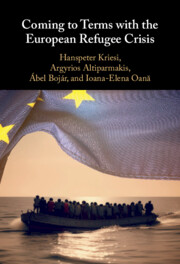Book contents
- Coming to Terms with the European Refugee Crisis
- Coming to Terms with the European Refugee Crisis
- Copyright page
- Contents
- Figures
- Tables
- Preface
- Part I The Refugee Crisis in the EU and Its Member States: Our Approach in Context
- Part II Policymaking: Actors and Conflict Structures
- Part III The Dynamics of Policymaking
- Part IV Outcomes and Conclusion
- References
- Index
- References
References
Published online by Cambridge University Press: 04 February 2024
- Coming to Terms with the European Refugee Crisis
- Coming to Terms with the European Refugee Crisis
- Copyright page
- Contents
- Figures
- Tables
- Preface
- Part I The Refugee Crisis in the EU and Its Member States: Our Approach in Context
- Part II Policymaking: Actors and Conflict Structures
- Part III The Dynamics of Policymaking
- Part IV Outcomes and Conclusion
- References
- Index
- References
Summary
- Type
- Chapter
- Information
- Coming to Terms with the European Refugee Crisis , pp. 379 - 396Publisher: Cambridge University PressPrint publication year: 2024
- Creative Commons
- This content is Open Access and distributed under the terms of the Creative Commons Attribution licence CC-BY-NC 4.0 https://creativecommons.org/cclicenses/



